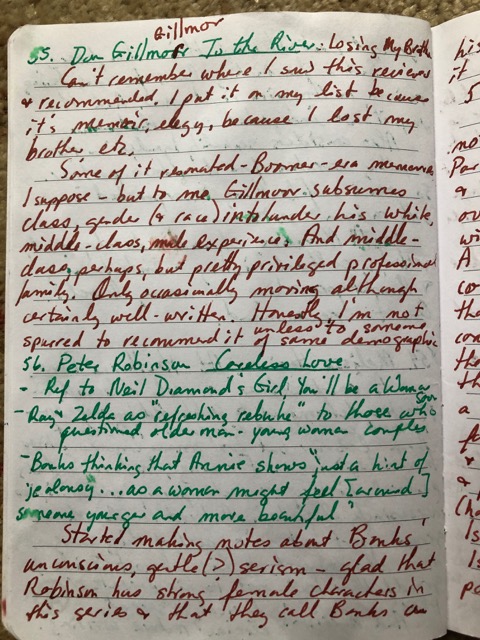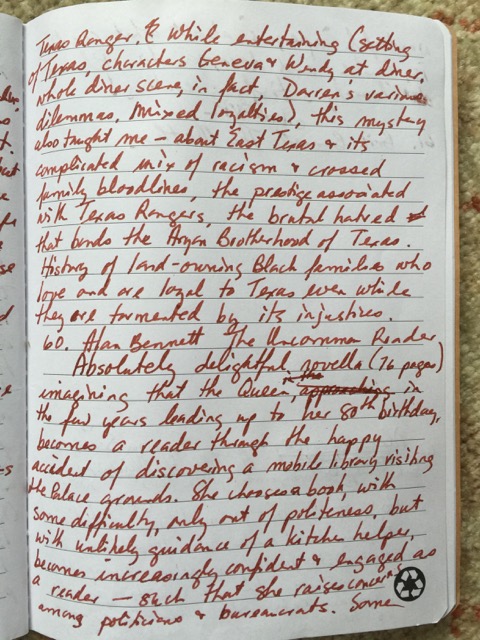Rainy and windy here in Vancouver today. Perfect weather for curling up with a book, and I have a few good candidates (currently reading Iza's Ballad by Margo Szabó and Marc E. Agronin's The End of Old Age). But those are books I'll tell you about next month. Right now, instead of curling up on the couch with a book, it's time to tell you what I read in September.
I started the month with Brit Bennett's The Vanishing Half. Bennett is one of the authors I added to my TBR list after Ibram X Kendi posted about a campaign encouraging readers to buy any two books by Black writers. The goal of the campaign was to "Blackout bestseller lists with Black voices" and thus demonstrate Black power and clout in the publishing industry -- in turn, encouraging the development of more Black writers to all our benefit. My bookshelves already hold many books by Black and indigenous and Asian writers; reading these has rewarded me richly. (I suggested some authors you might like to read in my own #BlackPublishingPower post).But most of these fall under the rubric of "literary novels," however elitist or arbitrary that term might be. In one of my favourite genres -- mystery novels -- Black writers have been sadly under-represented. (Oyinkan Braithwaite's marvellous My Sister, the Serial Killer a happy exception I posted about here; have you read this yet? You must!)
As it turns out, I was mistaken in thinking that The Vanishing Half was a mystery novel. At least, there's a mystery driving the narrative, as the title hints, but there's certainly no murder to be solved. My friend Sue wrote about reading this book for her Book Club discussion around a campfire last month -- we must have been reading it at the same time. If I'd been able to pop in, I could have used the notes in my Reading Journal as prompts reminding me of what I might contribute to a conversation. . .
Second book of the month: Melissa Harrison's beautifully lyrical and elegiac (perhaps a bit melancholy) At Hawthorne Time. . . Harrison writes nature, particularly English nature, so compellingly, obviously from a foundation of rigorous and loving observation. I would say that if you liked Raynor Winn's
The Salt Path you might enjoy Harrison's writing, although Winn's is memoir and Harrison's fiction. My Reading Journal entry photo is above, #54.
Next, I read Don Gillmor's To the River: Losing My Brother and wrote a few words about this bereavement memoir in this Instagram post and also in my journal.
Time for a mystery, and the library obliged with Peter Robinson's Careless Love. I still enjoy this series (I think I've fallen one title behind), but as my notes -- see photo above -- indicate, I found myself impatient with Inspector Banks' casual, unconscious sexism, the assumptions he makes about women's motivation, behaviour, thoughts, etc. Glad Robinson includes strong female characters to call Banks on it.
. .
Such a good month for books, a standout being Aysegül Savas' s Walking on the Ceiling (I apologize for not writing the "s"s in her name with their cedillas; not an option I can see on my MacBook Air). A beautiful novel that will take you to and through the streets of Paris. . . and take you to Istanbul as well. Not as a tourist, though, but as one exploring notions of Longing and Belonging, considering Place and Memory. I've posted some favourite passages from the book on Instagram.
And I loved
this interview of Savas by Catherine Lacey. What a wonderful conversation about fiction-writing in general although seen through the focus on
Walking on the Ceiling. Here's an excerpt from Lacey's introduction to the novel : "
The book’s sensitivity never veers into the saccharine; it is tender without being too self-enamored. I feel that all dyed-in-the-wool readers, lonely in some intractable core of ourselves, crave books like this, books that walk along side us, books that are companions of contemplation, not distractions from life but magnifying lenses for it."
September kept delivering! I was introduced to Sandro Cellini, a private detective (ex-police) in his 60s, in Christobel Kent's A Time of Mourning. Not only does this title offer a cleverly plotted mystery featuring the streets (and rising waters) of Florence and great characters (old and young, a very welcome diversity of ages), but it's the first of a series. I can't wait to read the rest and highly recommend this one to the mystery lovers among you.
And I did discover a new-to-me Black writer of a mystery series featuring a Black Texas Ranger (I learned of Attica Locke's writing through the
Instagram account of her sister Tembi Locke whose
From Scratch is a beautiful memoir about love, bereavement, family, and Sicily --
mentioned in this post.
Bluebird Bluebird is the first volume in this mystery series, and I'm looking forward to reading more. Not everyone wants their escape reading to reflect real-world problems too seriously, but I have always appreciated the genre for its ability to consider morality and justice, the meaning of good and evil, the relationship between an individual and community. The best writers in the genre willingly explore the way that crime and justice sit in a context of racial, class, gender and sexuality (in)equality . . . while repaying our attention by introducing us to new places and intriguing characters and entertaining, even thrilling, plots.
Bluebird Bluebird does all of that.
My quick handwritten response to the mystery above and below, in red ink. . . And two pages from the e-book to give you a sense of the context
Texas Ranger Darren Matthews' mother represents a much different background and lifestyle than does his father's family, and it's the latter in which Darren has grown up, raised by his two paternal uncles after his father died. Right from the outset, then, a complexity that asks readers to think beyond stereotypes and acknowledge the rich complications of history and place, justice and allegiance.

The last book I read in September is a short book -- Alan Bennett's novella The Uncommon Reader. Uncommon, indeed. Bennett imagines Queen Elizabeth discovering, in her eighth decade, the inordinate pleasures of reading . . . and becoming rather impatient with duties that rob her of reading time.
I read this as an e-copy borrowed from the Vancouver Public Library, and I kept screen-shooting pages on my iPad. Really, I need to own a copy of this so that I can underline and post-it-note favourite pages . . . and "entertain" my family and friends, in my dotage, by pulling the book from its shelf and reading aloud. The passage I posted earlier on Instagram, for example: What she was finding also was how one book led to another, doors kept opening wherever she turned and the days weren't long enough for the reading she wanted to do.
and this one, on the difference between being briefed on a topic and reading about it for oneself: Briefing is terse, factual and to the point. Reading is untidy, discursive and perpetually inviting. Briefing closes down a subject, reading opens it up. (emphasis mine)
I'll post a few more pages to my Instagram Reading Account as soon as I've got this post published, but meanwhile, here's what Bennett's "Her Majesty" thought of Canada, her mood influenced by her planned travel-reading "having unaccountably gone missing" and her favourite reader-attendant having been re-assigned. . . . Thank goodness my country was redeemed in HRH's eyes by Alice Munro.
Indeed! What treats indeed!
And that seems a good note to close on, the thought of the great pleasure in coming "across an author one enjoys and then to find they have written not just one book but at least a dozen." . . A half dozen would be a decent pleasure as well . . . This year I discovered Siri Husvedt and Elif Shafak and Attica Locke and Jess Kidd and Chirstobel Kent and Melissa Harrison and Brit Bennett . . . and numerous others. . . What about you? Any authors you've recently discovered, whose backlist you're anticipating reading with pleasure? Or if not, any books you've been rereading and finding even more enjoyable or relevant than the first time you read them. Of perhaps you'll just share books you've liked (or not!) recently. I'm always keen to hear from you and I love to read the conversations that develop in this space. Thank you, in anticipation.










